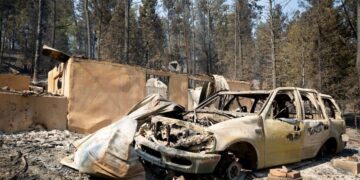A Campus Reckoning: How Charlie Kirk’s Death Is Shaping Student Dialogue Across America
The tragic death of Charlie Kirk, a prominent conservative youth activist, has sent ripples through college campuses across the United States. Known for his fiery rhetoric and leadership of Turning Point USA, Kirk was a polarizing figure whose influence reached deep into student political organizations. His sudden and violent death has not only shocked the nation—it has ignited a wave of reflection, debate, and reckoning among students navigating an increasingly polarized academic landscape.
A Moment of Mourning—and Messaging
Just hours after the news broke, student leaders like Riley McArdle, a senior at the University of Alabama and head of the College Republicans, began receiving messages from across campus. Some came from fellow conservatives expressing grief and solidarity. Others arrived from liberal and progressive student groups, offering formal condolences despite ideological differences.
This immediate response revealed something deeper: Kirk’s death transcended political boundaries. It was a human tragedy that prompted students to pause, reflect, and reconsider the tone of campus discourse. In an environment often marked by division and tribalism, the shared grief created a rare moment of unity.
The Power—and Pressure—of Campus Politics
College campuses have long been hotbeds of political activism. From civil rights marches to climate protests, students have historically played a vital role in shaping public opinion. In recent years, however, the tone of campus politics has grown more combative. Social media, ideological echo chambers, and national polarization have all contributed to a climate where debate often devolves into hostility.
Charlie Kirk was emblematic of this shift. His speeches and social media presence were unapologetically provocative, challenging progressive norms and rallying conservative students. For his supporters, he was a champion of free speech and traditional values. For his critics, he represented a confrontational style that stoked division.
Now, in the wake of his death, students are grappling with the consequences of that polarization. Many are asking: Have we gone too far? Has the culture of outrage and confrontation made campuses less safe, less thoughtful, and less humane?
A New Kind of Dialogue
In the days following the tragedy, student organizations across the country began organizing vigils, forums, and open dialogues. At some schools, conservative and liberal groups co-hosted events to honor Kirk’s life and discuss the state of campus discourse. These gatherings weren’t just about mourning—they were about reckoning.
Students shared stories of feeling silenced, attacked, or misunderstood because of their political beliefs. Others spoke about the fear of expressing dissenting opinions in classrooms or online. The conversations were raw, emotional, and often uncomfortable—but they were necessary.
For many, Kirk’s death became a catalyst for change. It forced students to confront the toxicity that had seeped into their political spaces and to imagine a better way forward—one rooted in empathy, curiosity, and mutual respect.
Generational Impact
“This will scar this generation,” one student leader said during a campus vigil. The comment captured the emotional weight of the moment. Kirk’s death wasn’t just a news story—it was a generational event that exposed the fragility of civil discourse and the real-world consequences of ideological extremism.
Students who once saw politics as a game of winning arguments are now reckoning with its human cost. The tragedy has prompted many to reconsider their approach to activism, advocacy, and engagement. It’s no longer just about being right—it’s about being responsible.
Safety and Free Speech
The incident has also reignited debates about safety and free speech on campus. Should controversial speakers be allowed to visit universities? How can schools protect both expression and physical safety? These questions are not new, but they’ve taken on renewed urgency in light of Kirk’s death.
Some universities are reviewing their event policies, while others are investing in dialogue training and conflict resolution programs. The goal is to create environments where students can disagree passionately without fear of violence or retribution.
A Path Forward
While the pain of Charlie Kirk’s death is still fresh, it has opened the door to a more thoughtful and inclusive conversation about campus politics. Students are beginning to realize that ideological diversity is not a threat—it’s a strength. And that true activism requires not just conviction, but compassion.
As colleges continue to process the tragedy, there’s hope that this moment of reckoning will lead to lasting change. That students will build bridges instead of walls. That they’ll listen more and shout less. And that they’ll honor Kirk’s legacy—not by mimicking his style, but by striving for a more respectful and resilient political culture.













